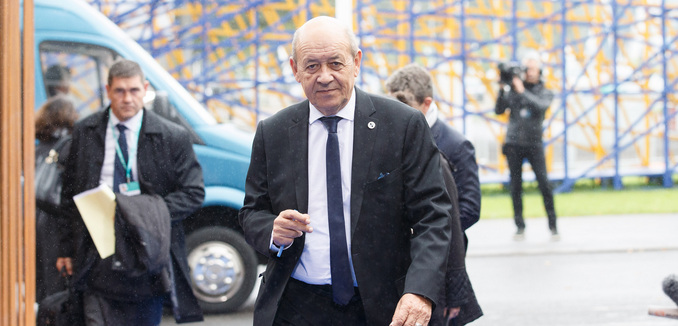France’s foreign minister accused Iran of violating the terms of a United Nations Security Council resolution that calls on it to not to develop ballistic missiles, Reuters reported Monday.
“We will also have the opportunity of underlining our firmness on Iran’s compliance with United Nations Resolution 2231, which limits access to ballistic capacity and which Iran does not respect,” French Foreign Minister Jean-Yves Le Drian said, as he arrived at a meeting with Europe’s foreign ministers.
UN Security Council Resolution 2231 formalized the 2015 nuclear deal with Iran, “calls upon Iran not to undertake any activity related to ballistic missiles designed to be capable of delivering nuclear weapons, including launches using such ballistic missile technology.”
Despite the language in the resolution, Iran’s leaders, including President Hassan Rouhani and Foreign Minister Mohammad Javad Zarif, have consistently said that they would accept no limits on their ballistic missile program.
Le Drian said that he would travel to Tehran in March to discuss the ballistic missile program as well as Iran’s “destabilizing” activities in Yemen, Lebanon and Syria. The foreign minister’s statement suggested that he had already begun talks with Iran about ballistic missiles and its regional entanglements. However, a spokesman for Iran’s foreign ministry dismissed the suggestion. “If there is such a quote (from the French foreign minister) that we held talks, we deny it. We have not had any negotiations about our missile and defense capabilities and will not talk about these issues with others,” Bahram Qasemi told Iran’s Tasnim News Agency.
Last month, Le Drian said that France was “determined” to prevent Iran from developing even more sophisticated ballistic missiles.
Also last month, both France and Germany reiterated their opposition to Iran’s continued ballistic missile development and called on the Islamic Republic to give up “its hegemonic temptations.”
France and Germany joined the United States and the United Kingdom in August, sending a letter to UN Secretary General António Guterres, charging that Iran’s launch of a satellite violated resolution 2231.
President Donald Trump, in October, said that he would not certify Iran’s compliance with the nuclear deal and demanded that four aspects of the deal be fixed or he would no longer waive the sanctions that were lifted as part of the accord. Trump has demanded that: new negotiations eliminate the sunset provisions of the deal that allow Iran to develop an industrial scale uranium enrichment program by the deal’s end, prohibit Iran from developing ballistic missiles, ensure “anytime, anywhere” inspections so that Iran will have to allow inspectors into its military sites, and to target Iran for sanctions for its human rights violations and support for terror.
Although Iran insists that its ballistic missile program is purely defensive, in November, Hossein Salami, the lieutenant commander of Iran’s Islamic Revolutionary Guard Corps (IRGC), threatened that if Europeans insisted on negotiating over Iran’s missile program, Iran would increase the range of the missiles to reach Europe.
Iran has tested ballistic missiles capable of reaching Israel and reportedly used a Star of David as a target for one of its ballistic missile tests.
A UN report last week found that Iran had supplied ballistic missiles to Houthi rebels in Yemen. This would be a violation of Resolution 2231, which prohibits Iran from transferring weapons—both conventional and ballistic missiles—to other countries.
[Photo: EU2017EE Estonian Presidency / Flickr]




